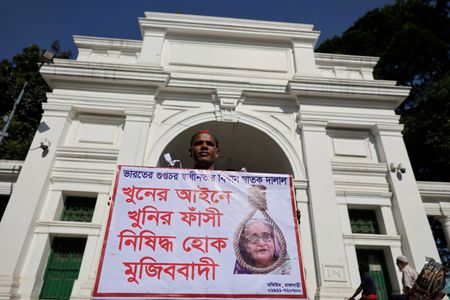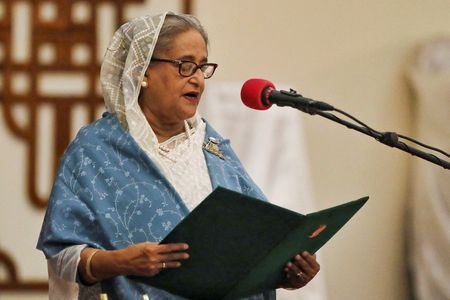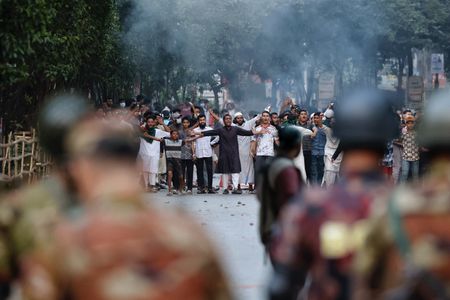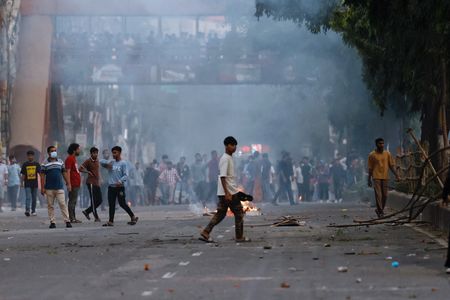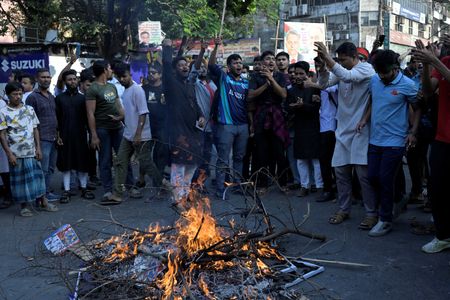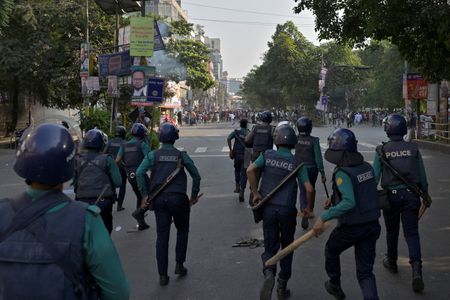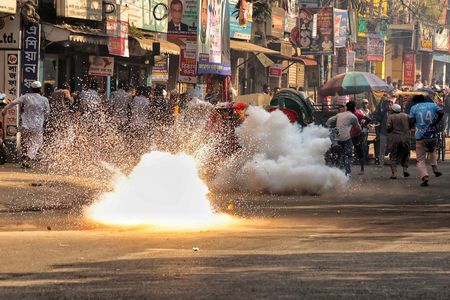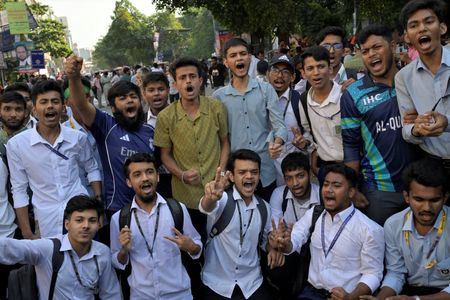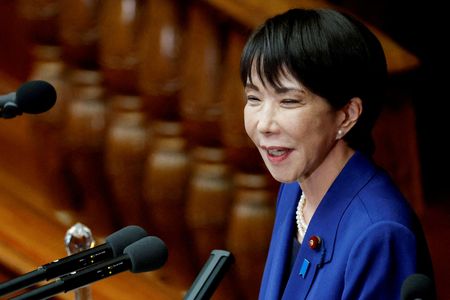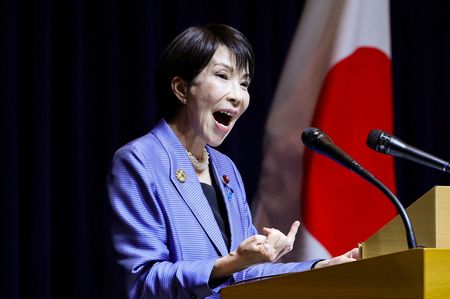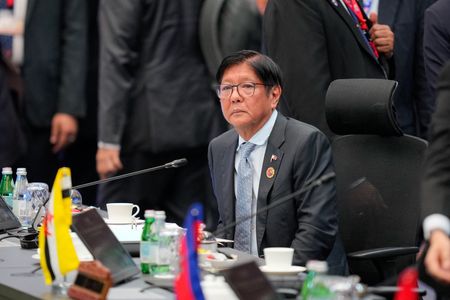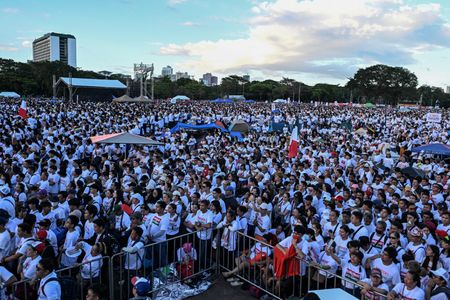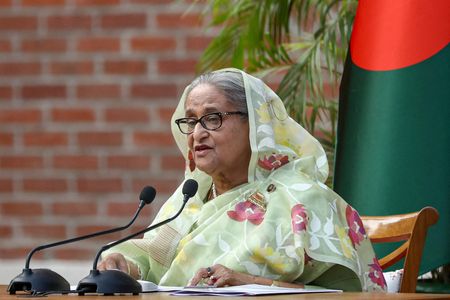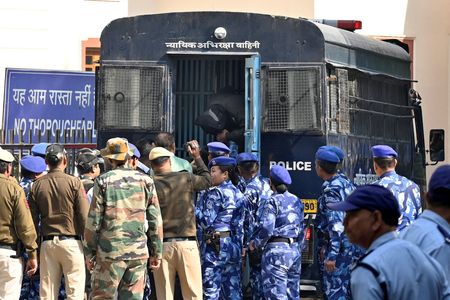By Ruma Paul and Krishna N. Das
DHAKA (Reuters) -Bangladesh’s ousted prime minister, Sheikh Hasina, was sentenced to death in her absence on Monday at the end of a months-long trial that found her guilty of ordering a deadly crackdown on a student-led uprising last year.
People in the packed courtroom – including families of victims – cheered and clapped, and some in the crowds outside sank to their knees and offered up prayers after the verdict, the harshest against a leader in the country’s history.
Hasina – who fled to neighbouring India in August 2024 at the height of the uprising against her government – issued a statement dismissing the court as a “rigged tribunal”.
The interim government led by Nobel laureate Muhammad Yunus described it as an “historic verdict”, but called for calm and warned that it would deal with any disorder.
After the verdict, the Bangladeshi foreign ministry called on India to extradite Hasina and former interior minister Asaduzzaman Khan Kamal, who was also sentenced to death in the same case. India said it noted the verdict and would “engage constructively”, without going into more detail.
CLASHES WITH PROTESTERS
Earlier, police clashed with protesters demanding the demolition of what remains of the house of Hasina’s father. Much of it was destroyed last year.
Police and paramilitary forces were deployed around government buildings and the tribunal complex, and there was tight security across the capital and other major cities.
The verdict comes ahead of elections in February and Hasina’s son warned on Sunday there could be violence if a ban on her Awami League party standing was not lifted.
A United Nations report estimated that up to 1,400 people were killed and thousands wounded — most by gunfire from security forces — during the anti-government demonstrations between July 15 and August 5 last year, the worst political violence in Bangladesh since its 1971 war of independence.
GOVERNMENT SAYS CHAOS WILL BE DEALT WITH
Judge Golam Mortuza Mozumder said Hasina, 78, was found guilty on three counts including incitement, ordering killings and failing to prevent atrocities during the uprising.
“We have decided to inflict her with only one sentence — that is, sentence of death,” Mozumder said.
In an emailed statement sent to media after the verdict, Hasina accused the court of being “biased and politically motivated”.
“In their distasteful call for the death penalty, they reveal the brazen and murderous intent of extremist figures within the interim government to remove Bangladesh’s last elected prime minister, and to nullify the Awami League as a political force,” she said.
The interim government urged Bangladeshis to remain calm, restrained and responsible and not to disrupt public order.
The judgment “may naturally evoke strong emotions among the public”, it said. “Any attempt to create disorder, chaos, or disturb public order will be dealt with strictly,” it added.
BOMBS SET OFF IN RUN-UP TO VERDICT
During the trial, prosecutors told the court that they had evidence of a direct command from Hasina to use lethal force to suppress the student-led uprising.
Hasina was represented by a state-appointed defence counsel who told the court that the charges against her were baseless and called for her acquittal.
Ahead of the hearing, Hasina dismissed the accusations, called the tribunal unfair and said a guilty verdict was “a foregone conclusion”.
The interim government rejected those charges. “The tribunal has functioned transparently, allowing observers and publishing regular documentation,” a government spokesperson said hours before the verdict.
“No credible human rights body has described the current process as politically driven,” they added.
Bangladesh was tense ahead of the ruling, with at least 30 crude bomb explosions and 26 vehicles torched across the country over the past few days. There were no reported casualties.
The interim administration has governed the Muslim-majority South Asian country of 170 million people since Hasina fled.
Military ruler Hossain Mohammad Ershad was sentenced to 10 years of rigorous imprisonment in 1991 for illegally possessing firearms.
Bangladesh is one of the world’s largest garment exporters, supplying major global brands. The industry was hit hard by last year’s protests.
(Reporting by Ruma Paul; Writing by YP Rajesh; Editing by Andrew Heavens)

